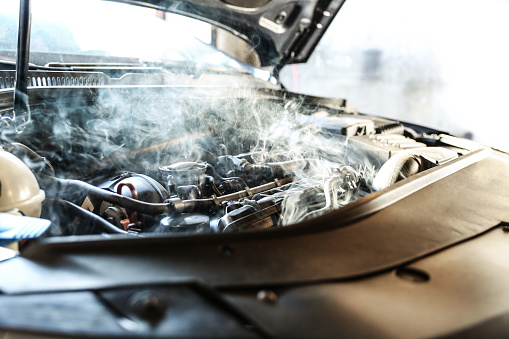January 17, 2025
Why Is Your Engine Overheated?
There are several reasons why a car engine may overheat, including:
- Low or no coolant: The coolant is responsible for keeping the engine at a safe operating temperature. If the coolant level is low or empty, the engine will overheat.
- Malfunctioning thermostat: The thermostat regulates the flow of coolant through the engine. If it is stuck closed, the coolant cannot circulate, causing the engine to overheat.
- Faulty water pump: The water pump circulates the coolant through the engine. If it is malfunctioning or failing, the coolant cannot circulate properly, leading to engine overheating.
- Clogged or leaking radiator: The radiator is responsible for dissipating heat from the engine. If it is clogged with debris or leaking, it cannot properly cool the engine, leading to overheating.
- Broken cooling fan: The cooling fan is responsible for drawing air through the radiator to cool the coolant. If it is broken, the engine may overheat.
- Faulty head gasket: The head gasket seals the engine block and cylinder head. If it fails, coolant can leak into the combustion chamber, leading to engine overheating.
- Improper engine timing: If the timing of the engine is incorrect, the engine can produce excess heat, leading to overheating.
It’s important to address any overheating issues promptly as they can cause serious damage to the engine if left unchecked.
Can I still drive if my engine overheats?
Driving with an overheating engine is not recommended, as it can cause severe damage to your vehicle. Here’s what to consider:
Immediate Steps
- Pull Over Safely: If your engine is overheating, pull over as soon as it’s safe and turn off the engine.
- Turn on the Heater: If you need to keep moving briefly to find a safe spot, turn on your heater to draw heat away from the engine. This is a temporary measure.
- Check Coolant Levels: After letting the engine cool completely (usually 30-60 minutes), check the coolant level. If it’s low, add coolant or water if necessary.
Risks of Continuing to Drive
- Engine Damage: Driving while overheating can warp engine components, damage the head gasket, or cause the engine to seize.
- Increased Repair Costs: What could have been a minor issue might escalate to a costly repair.
When Is It Safe to Drive?
- Only drive briefly to move to a safer location.
- If coolant is low, refill it temporarily and proceed with caution to the nearest repair shop.
If the overheating persists or you’re unsure of the cause, have your vehicle inspected by a professional mechanic before driving further.
Is it expensive to fix an overheating engine?
Fixing an overheating engine can vary significantly in cost, depending on the cause of the issue. Below are some common causes of engine overheating and their estimated repair costs:
1. Low Coolant Levels
- Solution: Refill or flush and replace coolant.
- Cost: $50–$150 (DIY or mechanic).
2. Thermostat Failure
- Solution: Replace the thermostat.
- Cost: $150–$300.
3. Radiator Issues
- Solution: Repair or replace the radiator.
- Cost: $300–$1,200 (repair or full replacement).
4. Water Pump Problems
- Solution: Replace the water pump.
- Cost: $300–$800.
5. Damaged Hoses or Clamps
- Solution: Replace damaged hoses or clamps.
- Cost: $100–$250.
6. Head Gasket Failure
- Solution: Replace the head gasket.
- Cost: $1,500–$3,000 (due to labor-intensive repairs).
7. Cooling Fan Issues
- Solution: Repair or replace the fan or motor.
- Cost: $200–$500.
8. Engine Damage
- Solution: Repair or replace engine components, or the entire engine.
- Cost: $2,500–$5,000+ (major engine repairs).
Key Factors That Influence Cost:
- Severity of the Damage: Minor issues (e.g., coolant top-up) are inexpensive compared to major repairs (e.g., head gasket replacement).
- Vehicle Make/Model: Parts for luxury or imported vehicles tend to be more expensive.
- Labor Costs: Prices can vary depending on the shop’s hourly rate and your location.
If your engine is overheating, it’s crucial to address it promptly to prevent further damage. Letting the problem linger can lead to more expensive repairs or even complete engine failure.


